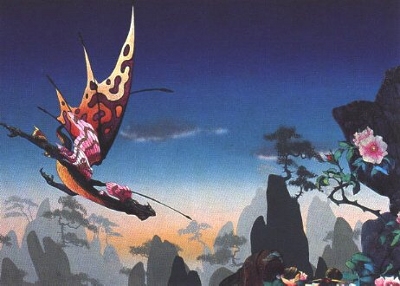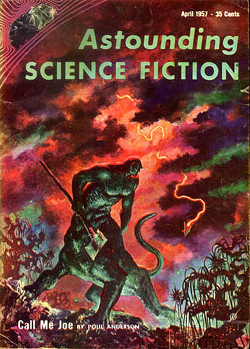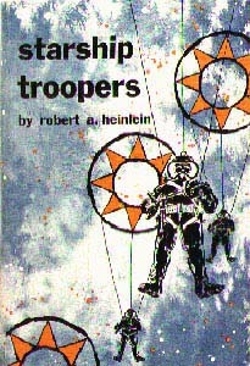According to legend, James Cameron was a truck driver when the first Star Wars movie broke out as a huge success and turned the slightly older, slightly craftier, and slightly more imaginative George Lucas into the cinematic empire-builder of our age. Since then, clearly, Cameron has become a Lucas acolyte and wannabe, cobbling together pilfered elements, very much in the manner of his master, to produce "original" works of fantastic cinema. But the thing is, Lucas (and his team) put a considerable amount of more imagination -- and, for a while, heart -- into the process; mixing flat-out Flash Gordon copycatting with New Age goo proved revolutionary indeed, and continues to astound the youngsters.
With the release of Avatar, I am forced to discount any creative prowess Cameron may have possessed -- and, in fact, to reconsider his career mostly in the terms of a bombastic pop-cultural thief, nothing at all like the crafty synthesizer Lucas once was. Has Cameron ever had an original idea? For his breakout hit, The Terminator (1984), he was forced to acknowledge his debt to sci-fi writer Harlan Ellison, and since then the lifts from the late Philip K. Dick have become apparent. Likewise, the huge (and beloved) smash, Aliens (1986), which -- under even vague scrutiny -- reveals itself to be not only an uppity sequel to Ridley Scott's 1979 masterpiece, Alien, but also a long, shameless ripoff of Robert A. Heinlein's 1959 novel Starship Troopers (with dollops of the third act of 1954's giant-ant-attack movie, Them!, thrown in). Since then, what has Cameron delivered? A few modest points for the originality of 1989's The Abyss (which, pardon the pun, sort of tanked). Then a brain-squelching sequel to his Ellison knockoff (1991's Terminator 2: Judgment Day), a remake (1994's True Lies) and a big, bloated TV movie (1997's Titanic).
I ask: Can James Cameron think for himself?
Unfortunately, I got my answer with Avatar, which I saw a few weeks ago. The answer, alas, is: No.
Unlike many, I wasn't caught up in Avatar's silly hype, plus I have my own sexy stack of sci-fi paperbacks from which to pilfer, so I really don't hunger for Cameron's facile, diluted concepts and scenarios. (Incidentally: Sci-fi and fantasy films have been doing exceedingly well during his absence.) Nonetheless, a friend wanted to go, so I went, and I stared glassily at the high-res videogame up there on that IMAX screen, for what seemed like ten hours. Bottom line: Avatar was kind of neato, but nowhere near inventive enough to assuage my interest in lunch. And not coincidentally, I had sat in the same cinema two years prior, for the industry prededent of Robert Zemeckis' 3D adventure, Beowulf, and frankly I liked that "game-changing" spectacle, and its far-sturdier story, a lot more. Sure, I got a few rudimentary kicks from Avatar, but mainly I was shocked at its blatant lack of imagination, and its absurdly two-dimensional narrative.
Literally from the first note, I knew Avatar would be a predictable ride at best. The note was that peculiar "Middle Eastern woman yodeling to signify Outer Space" thing, made popular in, among other shows, television's reboot of Battlestar Galactica. "Okay," I thought -- already fully cognizant of South Park's pre-emptive satire on Avatar, 'Dances with Smurfs,' -- "here we go..."
Had Avatar come and gone, as I'd have predicted at that mediocre screening (with higher hopes for the tastes, and memories, of the viewing public), presently I'd be tidying up my Terry Gilliam interview -- now there's a visionary director! But Avatar is still hanging around and cleaning out wallets, thus am I forced to out its overall suckiness, along with some of its countless acts of shameless genre pilfering.
First, and most irritating to me, is Cameron's choice to call his planet/moon "Pandora" - a name simply stolen, not from Greek mythology, but from the exotic world of the Destination: Void series of true sci-fi genius Frank Herbert (Dune), with Bill Ransom. Really, Jim? You couldn't think of one original name?
The legacy of Poul Anderson.
Let us also note Avatar's acute similarity to Poul Anderson's 1957 novella, Call Me Joe, which features a paraplegic human who takes over a larger, stronger alien body on another planet, and eventually "goes native." Sound familiar?
Thereafter, oh man, it's just such a jumble. Let's start with the heavy machinery. The consciousness-transfer beds are essentially stolen from the also-none-too-original Wachowski brothers' The Matrix movies (i.e.: "jacking in"). The space marines -- yet again! -- are lifted wholesale from Heinlein (whose Starship Troopers actually became an exciting and wonderfully satirical movie in 1997; watch it again, it's better than Avatar). Likewise, Heinlein's Mobile Infantry power-suits are swiped by Cameron. And the spaceships: Bleh. Been there, done that.
The legacy of Robert A. Heinlein.
Meanwhile, Cameron's "Pandora" itself is, essentially, a huge load of outtakes from the exotic planets of The Clone Wars, occasionally punched up by what one astute critic has called, "Yes album-cover art" (meaning the work of Roger Dean -- a comparison as hilarious as Dean's work is impressive). Toss in a protracted, migraine-inducing blur of swooping "banshees" (i.e.: dragons ripped straight from Anne McCaffrey's Dragonriders of Pern series; I hope she sues), and a bunch of mutant beasts which are, frankly, rather stupid-looking, and this "Pandora" really ain't no great shakes.

The legacy of Roger Dean.
(To be fair, however, despite the alien environment's shocking lack of originality, I will award Cameron one point, for one concept: I really haven't seen "icky psychic ponytail tendrils" anywhere before. Nice going, Jim. Or did a P.A. write that?)
Pilfered trappings aside though, ultimately, and most crucially, Avatar flies or sinks in terms of story -- and here is where I must award it an Epic Fail. This story sucks. It's predictable, boring and flat, and nowhere within it breathes a single character complex enough to sustain an adult's interest. Oh, those natives, they're so soulful and fierce (with a matriarch swiped from Timothy Zahn's Star Wars novels). Oh, those corporate suits, they're so heartless and mean (Aliens cannibalism). Oh, me, I'm so bored. It's dead, Jim! And furthermore, how has the worthless Sam Worthington risen to star status? Is "blank slate" the new mode of hero? Such dullness!
The legacy of James Cameron.
I know, I know: You love Avatar. You'd probably rather just "experience" it, and ignore any reasonable considerations about it. You're probably even irate that anyone would dare criticize a movie with such a deeply heartfelt "green" message. So let's make a deal. After your "experience," please go to McDonald's -- oh, such a "green" company, if ever there was one (Hello, Brazil!) -- and check out those Avatar Happy Meals. In particular, examine the mass-produced, non-recyclable plastic "Na'vi" figures with the four toxic button-cell batteries inside. Hold one of those things in your hand and think about it for a minute. And if you still love Avatar after that, by all means, please ship off for "Pandora."

